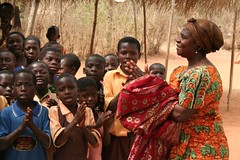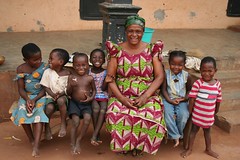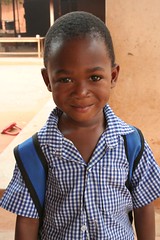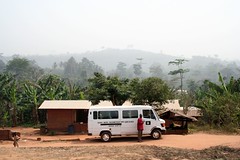Family feel to family planning Throughout history, family planning pioneers have been seen as radicals, feminists; pushing the boundaries of acceptable norms to bring greater choice and freedom to women. Their actions have been construed as modernist, sometimes counter-cultural: at the turn of the 20th century, for example, early birth control campaigners such as Marie Stopes in Scotland and Margaret Sanger in the United States were seen as a serious subversion to both men and society. In areas of rural Ghana, however, the relationship is much more complex; as traditional power structures and women with traditional authority embrace and adapt their roles to meet the needs of a changing society without changing the essential fabric of which that society is constructed. This female-led birth control and education is not about radical societal change, but rather about protecting social, cultural and familial norms; protecting the health of Ghanaian communities; and warding off the very monster of 'modern' times: HIV/Aids. In the Manya Krobo Traditional Area in the Eastern Region, Queen Mothers have harnessed their traditional position as community leaders to reach from the past into the present and the future, as they teach women and children about how to protect themselves and plan ahead. Traditional solution to a modern problem Esther Narkekie Kpabitey is Deputy Queen Mother of the Manya Krobo Traditional Area, and project manager of the Manya Krobo Queen Mothers Association. She believes that the role of traditional women leaders and role models within the community is more important now than ever. The role of a queen mother is not an easy one, she explains, and not simply a matter of being born into a royal family and raised in a particular way. A true Queen Mother will have shown her qualities from infancy: she will command respect, from women and men alike; she will be able to lead people when and where necessary; she will also lead an exemplary life and as far as possible be an ‘ideal" women; she will be charitable and industrious. A queen mother’s concern is for women and the family, but her role is a powerful one: to empower and equip those women to drive forward development. In Manya Krobo, the 371 queen mothers of the area have certainly taken this responsibility to heart, with the Association spear-heading not only HIV/Aids and family planning awareness programmes, but incorporating this as part of a more integral approach to family and women’s wellbeing. "It is the responsibility of a queen mother to know everyone in her community. The Paramount Queen Mother must know all of her Divisional Queen Mothers; the Divisional Queen Mothers must know all of their Community Queen Mothers, and all the Farming Area Queen Mothers. That way, no one is left out.” Being a queen mother might come with community recognition, with some prestige; but it certainly does not come with any income - the role is a voluntary one. “It can be an expensive job, as we sometimes end up giving money to our clients for food or medical bills.” Even so, the queen mothers are committed to weekly home visits of all the families in their communities – to chat, advise, and find out about their problems. Orphans and vulnerable children For some families, those problems are as easy and as difficult as where the next meal is going to come from. Sometimes, that poverty or illness leaves children without a parent to care for them at all, and it is the responsibility of queen mothers to know and care for such children: “We have identified 1,035 Orphans and Vulnerable Children (OVCs) living in the Krobo area,” says Manye Esther, who believes that orphancy is on the increase due to growing sickness and the incidence of HIV/Aids in the area. Of these children, many have now been taken in by the queen mothers, or their extended families; Manye Esther has three children currently sharing her family home. “We have concentrated on family and community care rather than orphanages – because there is such a stigma attached to these.” The aim is to give the children as normal an upbringing and environment as possible. The younger of the children are sent to the various schools in the area. “But many of the older children we find, those from about 13, don’t want to go back to school. For these, we are teaching them trades so that they can get jobs and fend for themselves.” In Manye Esther’s house, a batik lesson is underway, with one former OVC, now a programme facilitator, teaching two younger girls. “We train them as seamstresses, in batik craft, beads, soap-making and house keeping. Their produce is sold, with some of the money coming back to the project,” she says. The programme appears to be an innovative one, but is in fact just an extension of the traditional role queen mothers have always played in the area “The Queen Mother is supposed to be a mother for the community – it is a practise which has been around much longer than the problem of HIV/Aids orphans. If a parent passes away, it is the responsibility of the queen mother to see to the welfare of their children, and it is a blessing to take them into your home.” Family planning and HIV/Aids awareness Another core part of the vocational and life training received by the OVCs relates to a less traditional “problem,” however, the need for family planning in a society where large families reduce the food portions for everyone, and for protection against the late 20th century menace of HIV. “Even before Government started talking about family planning, we were talking to our women about it,” says Manye Esther. “From the late 1960s, the need to control family sizes and space the time between children, for economic reasons, was obvious.” Family Health International is an international non-governmental organisation which picked up on the informal work of the Queen Mothers Association in counselling on family issues, and decided to use the traditional network as a means of spreading up-to-date information about family issues. From 2003, the queen mothers received extensive training about family planning and on HIV/Aids, and have now become one of the principle condom suppliers to women in the area. Buying their condoms directly from the Ministry of Health and the District Health Management Team at cost price of ¢50 each, and selling them on for ¢75 or ¢100, the queen mothers are able to make a little profit on their sales – whilst offering women an up to 10-fold saving on shop prices. “Women buy from us because we are cheaper, and because shop condoms can also be unreliable – poor quality, or past their sell-by date,” says Manye Makutsu I, who is Queen Mother of Susui Division, and Project Assistant on the HIV/Aids programme. Sometimes women are also shy to make their purchase in public, she says. She explains how the queen mothers have used their influence to encourage increased condom use and health awareness. “People in my community know that every Sunday afternoon is home visit afternoon: and when I go to see a family, I always talk of condoms. Also if I go to a funeral, I talk of condoms. Every small meeting, I talk of condoms!” Now known as a discreet and reliable source for condoms, Manye Makutsu I carries them with her everywhere she goes, and has even composed several songs in Krobo about the importance of safe sex. The Association organises more official training and awareness programmes, using videos and written material to talk with school children about sex issues. They also work with some professional associations, such as the local hairdressers’ union and seamstresses’ group. For more thorough medical advice and treatment, however, the queen mothers refer their clients on to medical professionals: “We work hand in hand together,” says Alice Cournooh, the Principle Midwifery Attendant at the Odomase Adoptive Child Health Clinic, which specialises in family planning, antenatal care and child welfare. She has worked in the field for 20 years, and feels that the impact of the Association and other NGOs is increasingly supplementing the, frustratingly limited, government resources and programmes. Knowledge is not the same as changing attitudes, however: “I think awareness about HIV/Aids is very common now. People know, but they pretend as if they don’t know, because of the sex. Others just don’t care, they think: ‘I’m going to die at some point, whether I have HIV or not’.” Some people even want to spread the disease, she said, which is why education for young girls is so important, to increase their guard and reduce their vulnerability. “Infected men will go around offering girls money and gifts in exchange for sex.” Teenage pregnancy remains a problem in the area, particularly among poorer girls or those from more vulnerable backgrounds. “There are too many girls of 13, 14 years having babies. Some of them are living without their families, and they might say, ‘It’s because I had no one’. But often, they know what they are doing, and they don’t regret it when they become pregnant. They look at their friends with babies and think, ‘I want one’. It becomes the fashion.” Not for everyone, however, as many young girls and women try to induce an end to unwanted pregnancies, too often through quack abortions. “Often they will do it in the house; it will go wrong, and they will be brought to the hospital on the point of death.” On Monday, The Statesman reported on the shocking death rates from dangerous abortion attempts in Ghana. Speaking with women in Manye Krobo, it is not difficult to see why. Nurse Alice describes the methods often used by scared young women to rid themselves of unwanted pregnancies; including swallowing a concoction of ground-up glass and sugar. Her clinic is for family planning only, she says, and although on occasion she receives enquiries about professional abortion facilities, “we don’t cause abortions” and she would not show someone where to go for one. Dipo – a useful tradition On the issue of teenage pregnancies, the Queen Mothers Association have again attempted to harness a cultural tradition to tackle the problem. Adolescent initiation rites for girls are often seen as harmful practices; indeed, when female genital mutilation is involved, they are. But the non-physical Dipo rituals of the Krobo people have rather served to help young women, the queen mothers say. The ceremony, which normally takes place when a girl is about 15, marks her transition from childhood into adulthood – a kind of sexual rite of passage. Before the event, she is supposed to remain sexually pure, with disgrace for those girls who fall pregnant before they have undergone Dipo. “We are lucky with our traditions,” says Manye Esther. “It means that young girls are ashamed to get pregnant – the Dipo tradition is still very important.” Traditionally, the girls are taken away out of the village to be prepared for married life; they are taught about how to keep house, how to obey their husbands and live a life of discipline. The training used to be informal, with knowledge imparted by older women. But just as the Queen Mothers Association have commandeered their own traditions to deal with “modern” issues, so the Dipo rites have now been modernised: before a girl undergoes the Dipo ceremony, her training now includes formal counselling on family planning, sexual health and HIV/Aids, with the aid of manuals written in both English and Krobo. Living with HIV/Aids – community support The energy of these family planning and HIV awareness initiatives is encouraging, as government hospitals and traditional care-givers work together towards effective community-based care. Their initiatives, however, are a reaction to a problem whose existence cannot be denied. Even though the HIV prevalence rate in Ghana is amongst the lowest in sub-Saharan Africa – 2.7 percent in 2005 – this still means that more than half a million Ghanaian are living with the virus. The Queen Mothers Association aims to embrace the phenomenon from the top to the bottom; which means caring for those in their communities who have contracted the virus, and those who have subsequently developed Aids. Mary Sawer, 30, is HIV positive; she started developing Aids symptoms six months ago, and suffers principally from a running stomach, she says, as well as skin sores. Thanks to anti-retroviral drugs, however, the progression of the illness is being kept at bay. At ¢50,000 a month, the drugs are heavily subsidised (cost price is in the region of ¢2.7 million), and Mary’s drugs are bought for her by Manye Tamatekie, the Queen Mother of her community, and also her sister. Speaking in Krobo, Mary explained that she had been prepared to come out about her condition because of the support of her sister, and her sister’s standing in the community. Most others living with HIV are reluctant to make it public, she said, because even though groups such as the Association are working to break down the stigma attached to HIV, it still exists. Hannah Enniful, Principle Nursing Officer in the Voluntary Counselling and Testing Unit at the Atua Government Hospital, sees many of the Queen Mothers’ referrals. For her, community based care and partnership between community leaders who know their citizens and state health officials is the best way forward for health. “For some people, the anti-retrovirals are too expensive; and we give them away free to those who really can’t afford. But many people claim not to have money when they do. When we pay regular home visits, we know their houses.” Government resources are scarce and time precious; the days when a nurse could know everyone of the family’s in her catchment area are gone. But with the help of organisations such as the Manye Krobo Queen Mothers, community-based care, built out of traditional societal structures, is possible – and a proven formula for success against the HIV endemic. | |
Contact Information
Esther Kpabitey, Manye Nartekie
Programme Manager
Manya Krobo Queen Mothers Association
P. 0. Box 207
Odumase- Krobo, E/R
Phone: +233 – 244 – 803666
Email: makroqueens@yahoo.com
Programme Manager
Manya Krobo Queen Mothers Association
P. 0. Box 207
Odumase- Krobo, E/R
Phone: +233 – 244 – 803666
Email: makroqueens@yahoo.com
MKQMA in the News
- Queen mothers: gender, power and contemporary female traditional authority in Ghana (AEGIS European Conference on African Studies 2007)
- Boa me na me mmoa wo - Share with your community (Newmont - 2007)
- Family Feel to Family Planning (The Statesmen - 2007)
- We Come With Open Hearts (Toronto Star - 2007)
- Tinny Fetes 300 Orphans (Ghana Music - 2007)
- Every Child is Our Child (UU-UNO)
- AIDS in Africa (U of C)
- Goodwill Ambassador Misako Konno sees Ghana's Development gains (UNDP - 2003)
- Involving African Chiefs (U of C - 2003)
- Manya Krobo embarks on anti-HIV/AIDS campaign (GNA - 2003)

Manye Esther with Schoolchildren on a Community Visit

Manye Makutsu with Community Children

An orphaned child - happy and healthy under the care of a Queen Mother

MKQMA Vehicle used for Community Visits
Photo Credit: Marta Taylor